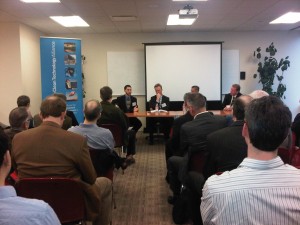 Featuring Michael Butler (CEO, Cascadia Capital), Daniel Malarkey (Deputy Director, Washington State Department of Commerce), and Avi Jacobson, (Sustainable Energy Coordinator, Multifamily Housing and Community Facilities Division, Washington State Housing Finance Commission) |
Featuring Michael Butler (CEO, Cascadia Capital), Daniel Malarkey (Deputy Director, Washington State Department of Commerce), and Avi Jacobson, (Sustainable Energy Coordinator, Multifamily Housing and Community Facilities Division, Washington State Housing Finance Commission) | ![]() Sponsored by Kane Environmental Inc. | Apr 10 | 730-900 | SOLD OUT!
Sponsored by Kane Environmental Inc. | Apr 10 | 730-900 | SOLD OUT!
The message from the Washington Clean Technology’s panel on funding cleantech businesses was that there is a tectonic shift taking place in the market place. Financing models from a few years ago are dead and gone, but new opportunities are significant.
 Straight alternative energy development plays are less attractive today to investors than efforts to deploy working technologies. Cleantech investment is happening, according to Michael Butler, the CEO of Cascadia Capital and a WCTA Board member, but more often it is through industrial packages, not venture capital. Capital efficiency is important to investors and small financings (up to $10 million) are the toughest to finance.
Straight alternative energy development plays are less attractive today to investors than efforts to deploy working technologies. Cleantech investment is happening, according to Michael Butler, the CEO of Cascadia Capital and a WCTA Board member, but more often it is through industrial packages, not venture capital. Capital efficiency is important to investors and small financings (up to $10 million) are the toughest to finance.
Daniel Malarkey, Deputy Director of the Washington State Department of Commerce and a WCTA board member, said he believed that the case for cleantech is just as compelling today as it ever has been. The financing markets are more difficult, but the need remains urgent. Governor Inslee has proposed over $100 million in new cleantech and environmental investments—which, Malarkey said, are likely to be a political football in the Washington State Legislature.
Investors are looking at natural gas as the driver of a thirty year shift in the American economy, said Butler. Despite the controversies that natural gas has created, Butler forecast that both Democrats and Republicans would embrace gas as a generator of new domestic jobs. The lower cost of energy, he said, is giving US manufacturing an advantage that it has lacked in previous decades. Transportation conversion is another likely source of attractive investments in natural gas.

Avi Jacobson, Sustainable Energy Coordinator, Multifamily Housing and Community Facilities Division, of the Washington State Housing Finance Commission, said that there are lots of building efficiency opportunities available that can provide benefits to investors and building owners. The WSHFC is looking for packages to help finance. Data centers, he noted, used one percent of total electricity generation and are growing swiftly. Efforts that reduce those costs are likely to be attractive.
WCTA speaker for several months have been talking about a long-term shift that the developments in natural gas have been driving. These developments will be the topic of our next breakfast on May 15. Registration and more information can be found here.
Michael Butler is Chairman & Chief Executive Officer of Cascadia Capital and a WCTA Board Member. Prior to co-founding Cascadia Capital, Michael served as a Managing Director at Lehman Brothers as head of global equity sales and equity syndicate for all non-tier one clients. He also served on the firm’s Equity Commitment Committee and Equity Syndicate Committee. Prior to his work with Lehman Brothers, Michael served as a Principal with Morgan Stanley & Company where he was responsible for global product and risk management for one of the firm’s operating divisions and was a member of the division’s operating committee. He has been involved in numerous equity financing transactions for both public and private companies. Michael holds a B.A. in Political Science from the University of Washington and an M.B.A. in International Finance from the Wharton School of the University of Pennsylvania.
Daniel Malarkey is Deputy Director of the Washington State Department of Commerce and a WCTA Board Member. Daniel was named Deputy Director in 2009. He serves as the department’s primary liaison to the private sector with responsibility for policy development to grow and improve jobs in the state. Malarkey has recently worked as a clean energy consultant to private companies and public entities. He brings over twenty five years of experience working on public policy issues as a consultant, business owner, and public employee. He was the founder and CEO of Washington Biodiesel, which developed an oil-seed processing and renewable fuels project in eastern WA. He served as General Manager of On-line Marketing at Amazon.com where he managed the group responsible for Amazon’s marketing relationships with other websites. Prior to working at Amazon.com, Malarkey was Managing Director of ECONorthwest, the region’s largest economic consulting firm. He has extensive experience in public infrastructure planning, finance, environmental economics, and economic development policy. He is a graduate of the University of Oregon and Kennedy School of Government at Harvard.

Avi Jacobson is Senior Sustainable Energy Coordinator of the Washington State Housing Finance Commission, where he develops and implements the Commission’s Sustainable Energy Program. He acts as the Commission’s legislative liaison for energy policy at the city, state and Federal levels to promote policies that support private investment in the clean technology sector. Prior to joining the Housing Finance Commission, Avi served as a Special Operations Weather Team leader in the United States Air Force and is a veteran of Operation Iraqi Freedom. He is a graduate of the University of Michigan College of Engineering, the Naval Postgraduate School, and the Case Western Reserve University School of Law.